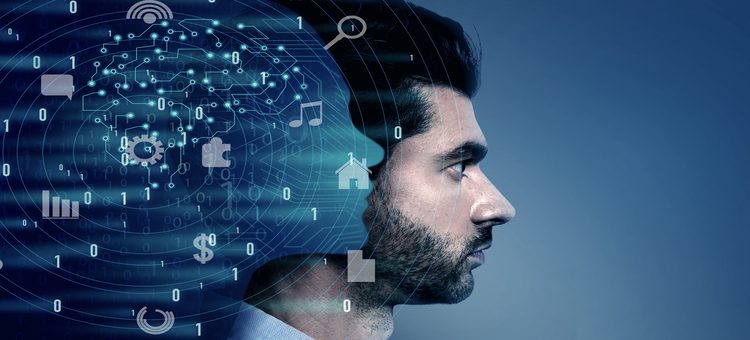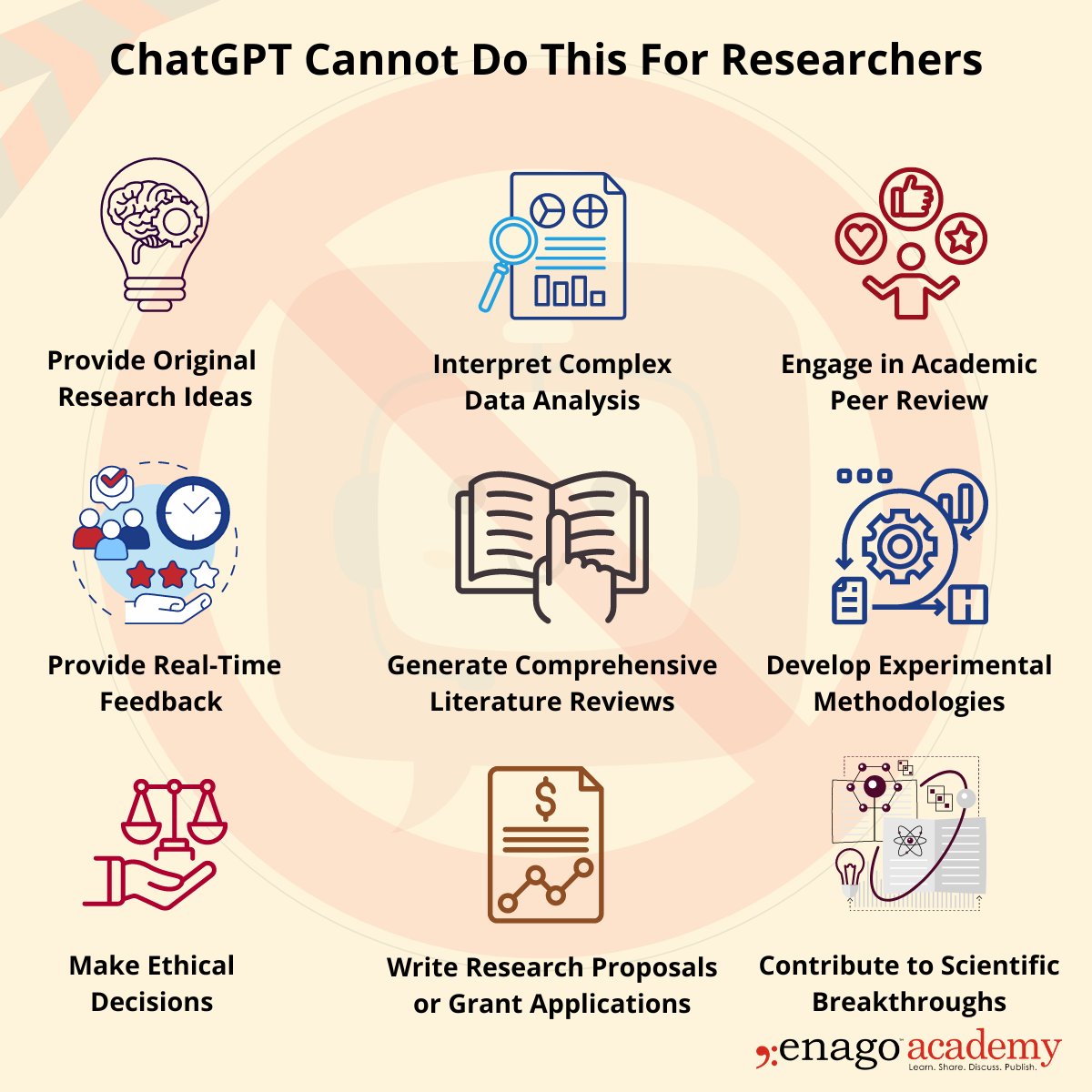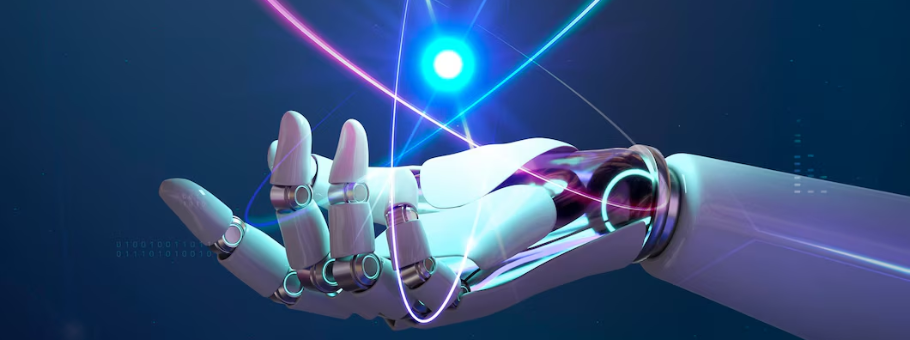9 Things Researchers Shouldn’t Expect From ChatGPT: Setting realistic boundaries

Sure, ChatGPT is being considered a superhero trying to save a lot of our hours, but what it is supposedly doing is only regurgitating the extensive amounts of outdated information that it is trained on (somewhere till September 2021). But can researchers rely on this model for innovation, creativity, and most importantly to add value to the scientific advancements that they are working hard for? Certainly never!
So, as the world hypes ChatGPT and other AI tools for writing their emails, let’s be realistic and address the things that ChatGPT can never do for researchers.
9 Things ChatGPT Cannot Do For a Researcher

1- Provide Original Research Ideas
- Original research ideas are the lifeblood of scientific progress. They drive innovation, expand knowledge, and pave the way for groundbreaking discoveries. However, generating these ideas goes beyond the capabilities of ChatGPT.
When asked to provide some original research ideas/topics to conduct a study in the field of chemical sciences, ChatGPT delivered a list of 3 basic and already existing research which are also on the fundamental topics of the field.
- ChatGPT’s algorithms lack the capacity for independent critical analysis.
- Unlike researchers, ChatGPT is not immersed in their respective fields, acquiring expertise, staying updated on the latest advancements, and developing a deep understanding of the intricacies within their domains.
- Researchers domain knowledge allows them to identify promising research directions, build upon existing knowledge, and propose innovative approaches to advance their fields. ChatGPT, on the other hand, lacks the extensive training and experience that human researchers bring to the table.
- ChatGPT, as an AI language model, is limited to its pre-existing training data and lacks the ability to actively participate in dynamic conversations and collaborations.
2- Interpret Complex Data Analysis
- ChatGPT may struggle with comprehending the nuances and complexities of these analytical approaches.
- Researchers, on the other hand, possess the necessary expertise and experience to navigate through complex data analysis, which ChatGPT cannot possibly acquire.
- ChatGPT fails to have a deep understanding of statistical methodologies, such as regression analysis, hypothesis testing, multivariate analysis, and machine learning algorithms.
- Additionally, ChatGPT cannot identify potential biases, confounding factors, or outliers that may impact the validity of the results.
- Researchers are trained to assess the robustness of statistical models, perform sensitivity analyses, and handle missing or incomplete data appropriately, ChatGPT doesn’t do this successfully.
- ChatGPT does not have the skills to communicate and visualize complex data analysis effectively.
- It cannot present the results in a clear and concise manner, using visualizations, tables, and graphs that enhance understanding and facilitate data-driven decision-making, which researchers can do with their expertise.
3- Engage in Academic Peer Review
- ChatGPT lacks the ability to assess the quality and validity of research papers, making it unsuitable for academic peer review.
- AI models like ChatGPT are trained on a vast amount of text data and can generate responses based on patterns and knowledge within their training data. However, they do not possess the domain-specific expertise or critical thinking skills required for rigorous academic peer review.
- ChatGPT or any other AI tool do not possess the necessary knowledge to evaluate the methodology, data analysis, interpretation, and overall contribution of a research paper.
- While AI technologies can support aspects of the peer review process, such as plagiarism detection or identifying pertinent research online, the final evaluation and judgment of a research paper’s quality still rely on expert human reviewers.
- The expertise and critical thinking abilities of human reviewers are invaluable in maintaining the rigor and quality of academic research.
4- Provide Real-Time Feedback On Research Progress
- Given its lack of contextual understanding, ChatGPT cannot provide real-time feedback on ongoing research projects.
- ChatGPT may not be able to evaluate research progress, which requires a deep understanding of the specific research area, the methodologies being employed, and the relevant literature and theoretical frameworks.
- It also cannot provide valuable guidance, critique, and suggestions based on its own expertise and familiarity with the research domain.
- Furthermore, researchers often participate in conferences, seminars, and workshops, where they have the opportunity to present their work to a broader audience and receive feedback in real-time, which ChatGPT obviously cannot do.
5- Generate Comprehensive Literature Reviews
- ChatGPT may struggle to assess the quality and relevance of sources, limiting its ability to generate comprehensive literature reviews.
- It cannot scrutinize research articles, books, conference papers, and other academic sources for their methodology, data analysis, theoretical frameworks, and contribution to the field.
- Furthermore, ChatGPT lacks the domain-specific expertise and contextual understanding required to evaluate sources comprehensively.
- While it can provide general information based on patterns in its training data, it may not be able to discern the nuances and intricacies of academic literature.
- It may also struggle to differentiate between high-quality research and less reliable sources, leading to potential inaccuracies or incomplete coverage in the generated literature reviews.
- ChatGPT seems to be unable to employ systematic approaches, such as search strategies, citation analysis, and rigorous selection criteria, to ensure the inclusion of relevant and representative sources in literature reviews, which researchers do regularly.
- ChatGPT can assist researchers in accessing a wide range of information and providing initial insights; however, its limitations in evaluating the quality and relevance of sources make them unsuitable for independently generating comprehensive literature reviews.
6- Write Research Proposals or Grant Applications
- ChatGPT may not fully understand the nuances of funding requirements, making it inadequate for writing research proposals or grant applications.
- It cannot fulfil the requirements of writing a tailor grant and include details about the research project’s objectives, methodology, expected outcomes, budget, timeline, and alignment with the funding agency’s priorities.
- It does not possess the expertise to interpret and incorporate these requirements effectively, ensuring that their proposals meet the specific criteria set by the funding agency.
- ChatGPT may not be able to articulate the rationale behind the project, highlight the societal or scientific relevance, and outline the expected outcomes and benefits.
- It may also not be able to draw on their expertise to craft persuasive arguments, present a coherent and well-structured proposal, and convey the feasibility and feasibility of the project to funding agencies.
7- Develop New Experimental Methodologies
- ChatGPT lacks the experience and domain-specific knowledge required to develop new experimental methodologies. Researchers possess the expertise to identify research gaps, formulate research questions, and design experiments that are tailored to address specific objectives.
- ChatGPT cannot bring their knowledge of existing methodologies, data collection techniques, and statistical analysis methods to develop innovative approaches that can generate reliable and meaningful results.
- Developing new experimental methodologies often requires a combination of creativity, critical thinking, and problem-solving skills, which ChatGPT or any other AI tool may not be able to do in their current forms.
- Thus, ChatGPT can provide support by offering information and facilitating literature exploration, it is the expertise and ingenuity of researchers that are essential for developing new experimental methodologies in scientific research.
8- Make Ethical Decisions in Research
- ChatGPT is not equipped to make moral judgments or navigate the complex ethical dilemmas that researchers may encounter. Researchers themselves provide the ethical framework necessary for responsible and ethical research practices.
- It is not trained to understand and apply ethical principles and guidelines specific to their field, such as those outlined by ethical review boards or institutional review boards (IRBs).
- It lacks the ability to understand the nuances of ethical decision-making and the complex ethical considerations that researchers face.
- Furthermore, it cannot discern the specific contextual factors, cultural sensitivities, or potential consequences associated with ethical decisions.
- It also cannot evaluate the ethical implications of research practices or anticipate the broader societal impacts of certain studies.
- While ChatGPT can provide general information on ethical guidelines, it cannot replace the critical thinking, moral judgment, and ethical considerations that researchers bring to the research process.
9- Contribute to Scientific Breakthroughs
- ChatGPT can provide support and offer insights based on patterns in its training data; however, it cannot independently lead to scientific breakthroughs.
- It lacks the ability to identify patterns, anomalies, and connections in data that could lead to new discoveries or insights.
- Human researchers excel in critical thinking, hypothesis formulation, and adapting existing theories to explore uncharted territories, which ChatGPT seems to never achieve.
- It cannot fully engage in the scientific inquiry process involving continuous questioning, hypothesis testing, and refining of ideas based on evidence.
- While ChatGPT can assist researchers by offering information and initial ideas, it lacks the intuition, creativity, and innovative thinking of human researchers.
- ChatGPT operates based on predefined patterns and cannot form novel connections, question assumptions, or think outside the box.
- It is incapable of designing groundbreaking experiments or proposing new theoretical frameworks due to its limited intellectual capacity.
Important Insights!
Can ChatGPT really compete with the brilliance of human minds? I think not. It’s like asking a parrot to come up with groundbreaking discoveries — it can only mimic what it’s been trained on, leaving true innovation out of the equation.
Speaking of interpreting complex data analysis, ChatGPT fumbles and stumbles in the face of intricate statistical methods. Can ChatGPT even comprehend the gravity of statistical significance? I highly doubt it.
When it comes to academic peer review, ChatGPT is a fish out of water. It lacks the domain-specific knowledge and critical thinking prowess of human reviewers. Would you bring a bot to a brainiac party? It’s clear that ChatGPT simply can’t keep up with the scholarly elite.
And what about real-time feedback on research progress? Sorry, ChatGPT, but your lack of contextual understanding and expertise leaves you floundering in the shallows. Can an AI tool attend conferences and engage in dynamic discussions? Definitely not in this digital age at least!
Let’s not forget about literature reviews. ChatGPT’s inability to assess source quality and employ systematic approaches means it falls short of generating comprehensive reviews. It’s like sending a blindfolded person into a library. So much for being an apparent literary genius.
Research proposals and grant applications? Sorry, but ChatGPT’s lack of understanding in funding requirements and its inability to articulate project rationale or feasibility makes it ill-equipped for the task.
Then, in the realm of experimental methodologies, ChatGPT is a novice among experts. Researchers bring their wealth of knowledge and experience to the table, while ChatGPT can only scratch the surface of existing methods.
Ethical decisions in research? That’s a job for human researchers. Can ChatGPT discern cultural sensitivities or anticipate the broader societal impacts? Absolutely not. Let’s leave the moral judgment to the ones who can actually comprehend it.
Finally, when it comes to scientific breakthroughs, ChatGPT is left in the dust. It can offer some insights and information based on patterns, but it’s no match for the critical thinking, creativity, and innovative minds of human researchers. Can ChatGPT really challenge assumptions, formulate hypotheses, or propose groundbreaking experiments? It’s time to give credit where credit is due — the true scientific heroes are the researchers like you who push the boundaries of knowledge.
So keep researching, keep writing! No AI can ever replace the human expertise in research and academic writing.









